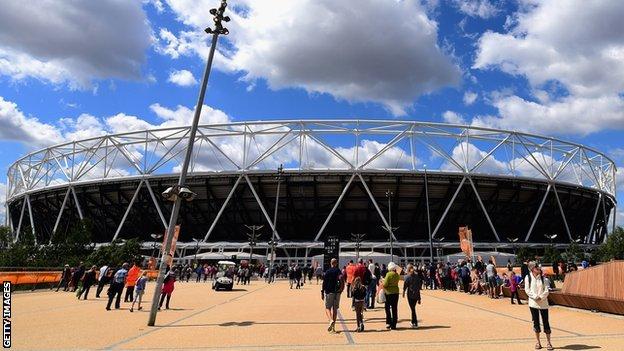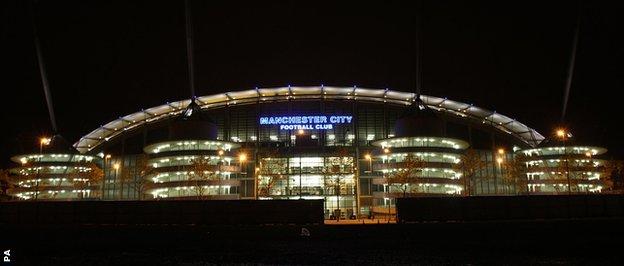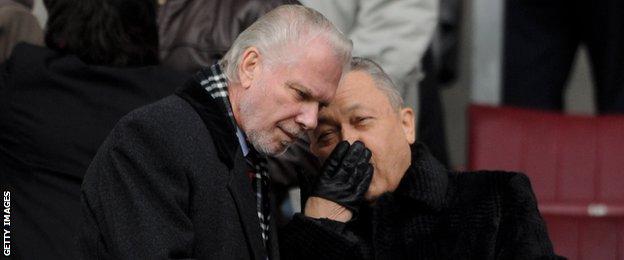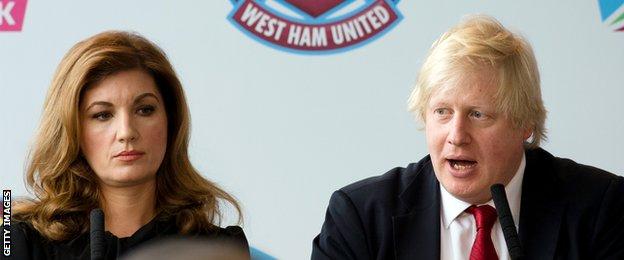West Ham: Taxpayers to meet Olympic Stadium running costs

Last updated on .From the section West Ham

West Ham United will have many of the running costs met by the taxpayer when they move to the £700m Olympic Stadium next year, the BBC has learnt.
Critics say it means the Premier League club will get their new home virtually rent free.
West Ham won the bid to occupy the stadium, which was built for the London 2012 Olympics, and are expected to move from their Upton Park ground in August 2016.
The public authority that owns the stadium, the London Legacy Development Corporation (LLDC), has revealed some details of its rental agreement with the club in response to a Freedom of Information request.
Much of the contract between LLDC and West Ham, which has been seen by the BBC, is redacted.
But it does show that a large number of "facilities and services" will be paid for by the grantor - ie the taxpayer - and not the club.
These include the cost of stadium utilities, security, maintaining the pitch, and even the goalposts and corner flags.
The BBC understands other overheads that could also be paid by the LLDC include the cost of stewarding and policing on match days, which amounts to many hundreds of thousands of pounds for other Premier League clubs.
Two separate football business experts told the BBC the value of the services amounts to between £1.4m and £2.5m a year.
West Ham, who received more than £76m in prize money for finishing 12th in the Premier League last season, are understood to be paying approximately £2m to £2.5m a year in rent.

Chris Bryant, Shadow Secretary of State for Culture, Media and Sport, called on the government to publish all the details of the deal or he will join calls for a full public inquiry.
"To all intents and purposes, this is a contract which gives West Ham the stadium at a peppercorn rent at most or, to be honest, for no rent whatsoever," Bryant told the BBC.
"The question is, if we were able to see the fuller facts and figures, which I think we should, would we be even more angry?"
West Ham said: "Without us the stadium would lose money. The suggestion we are getting the stadium rent free is categorically wrong - we are more than paying our way.
"Our agreement with the LLDC will see West Ham make a substantial capital contribution towards the conversion works of a stadium on top of a multi-million pound annual usage fee, a share of food and catering sales, plus provide extra value to the naming rights agreement.
"Our presence underwrites the multi-use legacy of the stadium and our contribution alone will pay back more than the cost of building and converting the stadium over the course of our tenancy."
The LLDC has not disclosed all the details of its agreement with West Ham.
It says it is restricted by financial confidentiality because of commercially sensitive figures, much to the frustration of those who feel the full terms should be revealed in the public interest.
Bryant said: "We're talking about such enormous sums of money that I think most British taxpayers would want to know what the deal was that was signed on their behalf, and that's the first hurdle that the government has got to cross.
"If it doesn't come through then I think the demands for a full public inquiry will grow and that's the point at which I'll start to want to join in those."
| West Ham statement |
|---|
| "Without us the stadium would lose money. The suggestion we are getting the stadium rent free is wrong - we are more than paying our way. |
| "There is absolutely no chance tickets will be dumped on the market. We need to move as we have simply outgrown the Boleyn Ground. |
| "It defies logic that David Gold and David Sullivan will sell the club. They have made it clear they would like to pass their shares on to their children. |
| "They were also happy to include a clause that would return a substantial sum of money to the taxpayer should they sell the club following our move to Stratford." |
When the final bill for the reconstruction of the stadium was revealed in June, West Ham's contribution of £15m towards the £272m conversion costs already looked like a bargain for the club - especially at a time when Premier League clubs are about to benefit from a record £5.1bn TV rights contract.
But they now appear to be getting an even better deal, raising serious questions over the way the stadium was used after London 2012, and whether there should be more transparency over the arrangement.
Barry Hearn, chairman of Leyton Orient when they dropped a three-year long legal challenge in 2014 against West Ham's move to the Olympic Stadium, said: "This is about the Olympic Stadium which has now been effectively transferred to a commercial enterprise for virtually nothing. Something doesn't smell right.
"It doesn't take a genius to work out, in today's world of Premiership football, that [the running costs] actually come to more than £2.5m a year."
That West Ham will not be paying those costs themselves is in contrast to the situation at Manchester City, who pay all their overheads - on top of rent of about £4m a year agreed with Manchester City Council - for the Etihad Stadium, which was also initially funded by taxpayers for the 2002 Commonwealth Games.
It has been reported that Chelsea and Tottenham may have to pay between £11m and £15m a year to play at Wembley if they temporarily use the national stadium while they redevelop their grounds.
The City of Manchester Stadium was always designed with football in mind as the sole post-Commonwealth Games use for the venue. That meant it cost £42m to convert, compared to the £272m bill that the Olympic Stadium's conversion has required - £35m over budget.
"They built the wrong stadium," Hearn said.
Asked why a multi-use stadium was not designed and built in the beginning, LLDC chief executive David Goldstone said: "I think that wasn't possible at the time.
"There wasn't an offer of a football tenant and, without football, it wouldn't have worked.

"It would have been a real leap to make that sort of decision, so I'm very happy those decisions that were made were the right ones.
"We can look forward now and say how can we best secure the long-term future so that it can be multi-use, it can pay its own way, and I think that's what we've done with this stadium."
The stadium was designed to be converted into a 25,000-seat athletics facility after the Olympics. However, it later became apparent that having a Premier League football club would be far more financially viable, with Tottenham Hotspur and West Ham left to fight it out as the two main bidders.
Spurs wanted to remove the running track, but that was seen as politically unacceptable when London's 2012 bid team had promised the International Olympic Committee that an athletics legacy would be maintained at the stadium.
West Ham were, therefore, seen as the only option, leaving them in a very strong bargaining position. The stadium then had to be converted for both football and athletics.
Bryant said: "It looks to me as if, because there was only ever one player that anybody was really interested in, that Boris Johnson (former chair of the LLDC) bent over backwards to accommodate them and West Ham ended up with a deal which is astoundingly good for them."
Exactly how good this "astounding" deal is remains unclear while so many pages of the published contract have been blacked out.
One of the key unknowns is how much money the taxpayer would receive as a 'claw-back' if West Ham were sold, at a profit, in the future.
| European Commission investigations relating to 'State Aid' |
|---|
| The European Commission is currently investigating four complaints of alleged 'State Aid' contributions involving 12 professional football clubs in the Netherlands and Spain. |
| Seven Spanish clubs are involved: Barcelona, Real Madrid, Valencia, Athletic Bilbao, Hercules, Elche and Osasuna |
| Five Dutch clubs are involved: PSV Eindhoven, Willem II, NEC, FC Den Bosch and MVV |
| The complaints range from possible tax privileges, loans given by the state-owned banks to a club, and the use of public resources to benefit certain teams |
While owners David Gold and David Sullivan insist West Ham is not for sale, they have expressed a desire to sell some shares and valued the club at £400m in December, four times its value when they arrived in 2010.
"It's highly likely that it will be sold to foreign investors," says Prof Simon Chadwick from Coventry University Business School. "If it's still in English ownership by 2020, I'll be very surprised."
West Ham's deal with the LLDC could come under scrutiny should a relevant party make a complaint to the European Commission, under EU competition law relating to 'state aid' contributions.
"State aid rules in Europe are there for a good reason, which is that no government should be giving financial advantage of whatever kind to one commercial player over another commercial player," Bryant explained.
"These are very real issues that are already affecting other football clubs in Europe.
"If it were subsequently proven that there had been illegal state aid provided to West Ham through this deal, then West Ham would end up having to pay back any potential financial advantage that might have accrued to them, which could run to the best part of half a billion."
However, Goldstone said: "I'm not losing sleep about whether somebody else is going to make a challenge into something that's already been looked at and considered and isn't being enquired into by the appropriate body any further.

"West Ham, I believe, have got a good deal, but we have got a really good solution to make sure that we bring billions of pounds of economic benefit into the area.
"We have an arrangement with West Ham where they pay a fee for using the stadium, effectively serviced, and that's the basic structure of the agreement."
The LLDC also points to the security gained by having an anchor tenant on a 99-year lease, and insists this will avoid the kind of 'white elephants' that blight Olympic parks in former host cities such as Barcelona, Athens and Beijing.
The stadium will only be given over to athletics for one month each year, but it will also host 10 annual community sports events, a new floodlit community running track and a training and education centre.
Boris Johnson declined a request to be interviewed by the BBC. However, a spokesperson for the London Major said: "The Olympic Stadium remains in public ownership and will be capable of hosting a variety of other events and sports.
"The mayor has secured long-term sustainable investment in order to protect an iconic stadium that Londoners took to their hearts, and which is now set to be home to almost every conceivable sport, concert or community event for decades to come.
"That has resulted in the creation of a venue that will drive and sustain thousands of jobs, contribute to over £3bn of wider economic benefit, where a share of the profits will be paid back into the taxpayers coffers and which provides a genuine Olympic legacy for London."
The Olympic Stadium: How the Hammers Struck Gold will be shown on BBC One London at 19:00 BST on Thursday, 6 August and available nationally on the BBC iPlayer shortly afterwards.